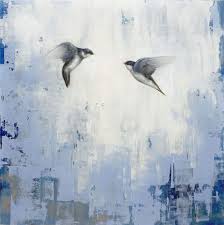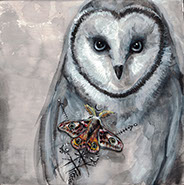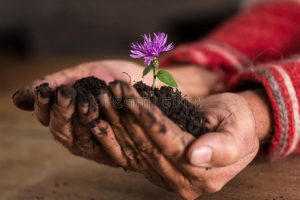 The Yogabliss, Your Heart Life on-line Moving into Meditation classes met this morning. We explored being as a field of awareness. The life affirming qualities we can cultivate from the field are rooted in caring. We can realize caring in the practice of accompaniment – sharing our fate. Dr. Paul Farmer made this practice a foundational strategy for bringing health services to people and places in most need. We worked with “seed” questions like “What does it mean to accompany or be accompanied on life’s journey?”
The Yogabliss, Your Heart Life on-line Moving into Meditation classes met this morning. We explored being as a field of awareness. The life affirming qualities we can cultivate from the field are rooted in caring. We can realize caring in the practice of accompaniment – sharing our fate. Dr. Paul Farmer made this practice a foundational strategy for bringing health services to people and places in most need. We worked with “seed” questions like “What does it mean to accompany or be accompanied on life’s journey?”
Today’s practice was informed by Ajahn Sucitto’s book, Parami, Ways to Cross Life’s Floods. The book outlines ten life affirming practices of: Generosity, Morality, Renunciation, Discernment, Energy, Patience, Truthfulness, Resolve, Kindness, Equanimity. This wonderful book is offered freely for download at the link above.
We reflected on what it means to be Treading the Path with Care as informed by Winton Higgins Tricycle magazine article. Winton traces the thread of care woven through the Buddha’s historic teachings. He asserts that there can be no mindfulness without caring.
We heard from An Anarchist Quaker’s Prayer to Soothe Anxiety by Ayu Sutriasa. Ayu is Digital Editor of Seattle’s YES! Magazine. Ayu invites us to become aware of what we are carrying and set it down for a while. She reminds us we are worthy just because we are.
 We drew on Dr. Paul Farmer’s 2011 Harvard Kennedy School commencement address. Dr. Farmer spoke about accompaniment. He spoke of accompaniment as “sharing someone’s fate for a while.” He cofounded Partner’s in Health which delivers health services to the poorest people on earth. You can learn more about Dr. Paul and Partners in Health by viewing the documentary, Bending the Arc. You can learn more about Dr. Paul’s early years in Tracy Kidder’s Mountains Beyond Mountains. You can learn a lot more about the battle against structural inequalities that present obstacles to health care as a human right by reading Dr. Paul’s last book: Fevers, Feuds and Diamonds.
We drew on Dr. Paul Farmer’s 2011 Harvard Kennedy School commencement address. Dr. Farmer spoke about accompaniment. He spoke of accompaniment as “sharing someone’s fate for a while.” He cofounded Partner’s in Health which delivers health services to the poorest people on earth. You can learn more about Dr. Paul and Partners in Health by viewing the documentary, Bending the Arc. You can learn more about Dr. Paul’s early years in Tracy Kidder’s Mountains Beyond Mountains. You can learn a lot more about the battle against structural inequalities that present obstacles to health care as a human right by reading Dr. Paul’s last book: Fevers, Feuds and Diamonds.
We ended with poet Muriel Rukeyser’s Elegy in Joy. Her work is inspired by her concern for human rights issues. Her work spoke to gender, class and racial inequalities. This poem speaks to “the love that gives us ourselves.” We are encouraged to nourish beginnings – beginnings contained in a seed, a seed that is blessed.
I invite you to take some time to create a posture in your body and mind that will help you to feel supported and at ease. Each of us is a field of awareness. We absorb and carry everything we’ve lived. We are exploring the field today with intention today. The invitation is to step out of the stream of habit into the pause. We have an opportunity to reclaim and gather our mental energy in the pause. We can seed a question in the pause. Where am I? Notice what the question touches; where it leads.
Moving to Body sensations, perhaps to those areas of contact with support. Where do you feel grounded and stable? Perhaps connecting with the back body, sit bones, legs and feet. Can you allow sensation to surface and be with it, investigate it for a while? You might feel upper back, arms and hands. What is the nature of the stream you are in right now? There may be areas of Body that are charged with energy. There be agitation, anticipation. There may be a sense of heaviness, tiredness or torpor. You can notice your chest and breathing sensations. What is the experience of letting your mind know what you are carrying right now?
 How am I? Perhaps there are emotions or thoughts present. Pause gives choice. What to follow? How does Body feel before emotion or thought? How does emotion or thought feel in Body? Heart? Mind? You may be meeting inner stillness. You may be flooded with feeling. What parts of the Body are still? What parts are surging?
How am I? Perhaps there are emotions or thoughts present. Pause gives choice. What to follow? How does Body feel before emotion or thought? How does emotion or thought feel in Body? Heart? Mind? You may be meeting inner stillness. You may be flooded with feeling. What parts of the Body are still? What parts are surging?
The practice invites us to meet feeling with Wise Attention. Is my mind creating stress or alleviating it? Can I widen my attention? Can I connect with breathing slowly or deeply? Is there a place where I can focus that is calming or that feels safe? Sometimes it can be opening closed eyes, taking a sip of water or touching Earth. How can I meet my experience with Wise Attention that is caring attention? Caring attention allows feeling or thought to be in the field along with whatever self-care that is needed. What kindness, patience or resolve can I offer myself? These qualities can be deeply supportive. There may be other qualities – love, tenderness, equanimity – you wish to cultivate. What is it like to cultivate them?
 In connecting with these supportive qualities we might sense their deeper meaning, their transpersonal nature. Each of us is part of a great field of awareness. We all suffer. We all want to be happy. We are all deserving of care. In his essay, Treading the Path with Care, Winton Higgins reminds us of the Buddha’s very last words: “Things fall apart; tread the path with care.” Winton writes that the Buddha taught friendliness, compassion, sympathetic joy and equanimity. All these qualities have their roots in care. He asserts that we can’t be mindful without caring. This is another seed question: How do we tread the path with care?
In connecting with these supportive qualities we might sense their deeper meaning, their transpersonal nature. Each of us is part of a great field of awareness. We all suffer. We all want to be happy. We are all deserving of care. In his essay, Treading the Path with Care, Winton Higgins reminds us of the Buddha’s very last words: “Things fall apart; tread the path with care.” Winton writes that the Buddha taught friendliness, compassion, sympathetic joy and equanimity. All these qualities have their roots in care. He asserts that we can’t be mindful without caring. This is another seed question: How do we tread the path with care?
In her prose writing, An Anarchist Quaker’s Prayer to Soothe Anxiety, Ayu Sutriasa, writes:
Hello sweet one. I see how much you care about the world, about your communities, about all of us surviving plagues and capitalism and a world on fire.
That clench in your throat, the knot in your gut, the tightness in your breath — this is how our bodies try to hold the world’s anguish. . . .
Just because your body can hold all the tragedy, the panic, the tension, that it is holding right now, that doesn’t mean that you must go on holding it, all, forever. The loving grandmother in you knows this to be true.
 Set it down. Somewhere nearby, so you can pick it up again when you need to, but just for a moment, relinquish your illusions of control. . . . not even the worst possible scenario would take away from your inherent worthiness. . . . .
Set it down. Somewhere nearby, so you can pick it up again when you need to, but just for a moment, relinquish your illusions of control. . . . not even the worst possible scenario would take away from your inherent worthiness. . . . .
No matter what, whether it turns out okay in the end or not, you carry the Divine within you. You are Enough, not because of the things you do but because of who you are fundamentally. Intrinsically. Always and without exception. Take a breath or two to allow yourself to Know this. . . .
We are each one person, breathing this one breath, with common Divinity.
We can do this. Together.
I invite you to give yourself kind attention. Time. Space. Presence. We may sense ourselves and each other resting in the field of awareness. Abiding in the great field, we can know there is caring and being cared for. “Take a breath or two to allow yourself to Know this.” You can allow any associations you have with caring, being cared for to surface in the field. You can connect with that loving grandmother being inside.
In our practice, we accompany one another on the path. Anthropologist and physician, Dr. Paul Farmer, spoke of community health work as accompaniment. He said:
 To accompany someone, is to go somewhere with him or her, to break bread together, to be present on a journey with a beginning and an end…There’s an element of mystery and openness….I’ll share your fate for awhile, and by ‘awhile’ I don’t mean ‘a little while.’ Accompaniment is much more often about sticking with a task until it’s deemed completed by the person or person being accompanied.
To accompany someone, is to go somewhere with him or her, to break bread together, to be present on a journey with a beginning and an end…There’s an element of mystery and openness….I’ll share your fate for awhile, and by ‘awhile’ I don’t mean ‘a little while.’ Accompaniment is much more often about sticking with a task until it’s deemed completed by the person or person being accompanied.
“Take a breath or two to allow yourself to Know this.” What does it mean to accompany someone? To be present on a journey with a beginning and an end. Dr. Paul reminded his audience that:
. . . even the erstwhile accompagnateurs [those who accompany others] need accompaniment. It doesn’t weaken this concept to note that everyone who draws breath needs accompaniment at some stage of life and that some need it more than others.
 “Take a breath or two to allow yourself to Know this.” What is your experience of having been accompanied? Who has kept you company? My heartfelt prayer is that you have had experiences of loving care and support. May all beings be blessed with accompaniment, loving care and support.
“Take a breath or two to allow yourself to Know this.” What is your experience of having been accompanied? Who has kept you company? My heartfelt prayer is that you have had experiences of loving care and support. May all beings be blessed with accompaniment, loving care and support.
Dr. Paul died last Monday. For nearly all his life he worked tirelessly to bring health care to the poorest of the poor around the world. I grieve his loss. I celebrate him and the many he trained to keep the heart and light of caring in health services. I take a breath or two to allow myself to know this.
I am grateful for your presence and this practice that invites us to nourishing beginnings as inn poet Muriel Rukeyser’s Elegy in Joy:
We tell beginnings: for the flesh and the answer,
or the look, the lake in the eye that knows,
for the despair that flows down in widest rivers,
cloud of home; and also the green tree of grace,
all in the leaf, in the love that gives us ourselves.
The word of nourishment passes through the women,
soldiers and orchards rooted in constellations,
white towers, eyes of children:
saying in time of war What shall we feed?
I cannot say the end.
 Nourish beginnings, let us nourish beginnings.
Nourish beginnings, let us nourish beginnings.
Not all things are blest, but the
seeds of all things are blest.
The blessing is in the seed.
This moment, this seed, this wave of the sea, this look, this instant of love.
Years over wars and an imagining of peace. Or the expiation journey
toward peace which is many wishes flaming together,
fierce pure life, the many-living home.
Love that gives us ourselves, in the world known to all
new techniques for the healing of the wound,
and the unknown world. One life, or the faring stars.

